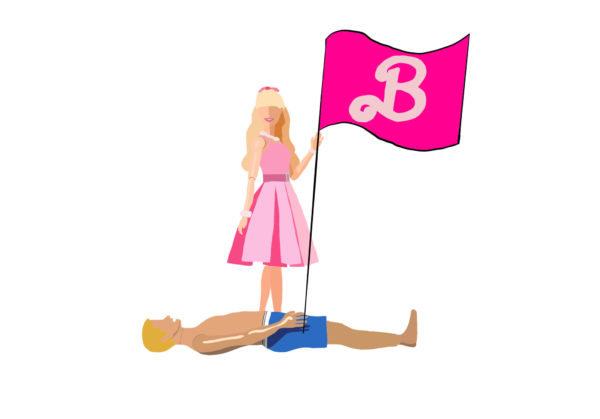
On July 21, 2023, the long-awaited film “Barbie” was released in theaters after spending nearly a decade in development. Directed and co-written by Greta Gerwig, the movie focuses on the journey of Barbie, a doll living in the matriarchal society of Barbie Land who ventures into the real world to confront the sources of her existential dread.
Although “Barbie” received high praise from film critics, who lauded it for its satirical commentary on misogyny and gender roles, the movie struck a nerve with the right-wing community, many of whom claim it promotes misandry — that is, prejudice against men. The backlash was met with justifiable criticism, most of which focused on one idea: that such anger comes from a misunderstanding of the movie and its themes.
While I fully agree that the outrage comes from a lack of understanding, I am disappointed that few people have actually taken time to fully deconstruct the misguided talking points of the people slamming “Barbie.”
Some have labeled the controversy “stupid” or “pathetic” without really delving into why it really exists. This approach is anti-intellectual. In actuality, the umbrage towards “Barbie” — while unwarranted — can serve as a useful case study in the importance of media literacy regarding satire and social commentary.
Much of the ire towards “Barbie” is directed at how the Kens are supposedly portrayed. Their perceived lack of individuality within Barbie Land’s matriarchy is a plot point that right-wing broadcaster Piers Morgan claims to be an “assault on men.”
Meanwhile, right-wing commentator Ben Shapiro focuses his contempt on Ken’s relationship with Barbie, claiming that his longing for a closer relationship makes him dependent on her. Moreover, he believes that the Kens’ attempt to usurp control of Barbie Land was meant to elicit anger and hatred. He thinks the movie vilifies Ken, and by extension, the men in the audience.
In reality, Ken’s emotional dependence on Barbie is a setup for his gravitation towards the patriarchy, not a means of belittling him. Ken is an allegory for how some men grapple with toxic masculinity, and his search for purpose is a commentary on how men see that system as a means of empowerment.
Moreover, the Kens’ insurrection in Barbie Land is actually a commentary on how patriarchal hierarchies and misogyny are often enforced through violence against women. It is a critique of a fundamentally flawed system; it is not misandrist libel.
Meanwhile, Barbie Land’s matriarchy is not meant to deprecate the Kens; it is an intentional subversion of patriarchal society designed to set the stage for Ken’s allegorical descent into toxic masculinity.
Ken’s reconciliation with Barbie also vexes Shapiro. He misinterprets the idea of Kens and Barbies independently seeking purpose to be an endorsement of gender segregation, when it is actually the recognition that the strict gender roles of Barbie Land cannot bring fulfillment, just as patriarchal gender roles hinder us in the real world.
While it’s easy to dismiss the backlash against “Barbie” as reactionary intransigence, as some have done, such a response is unproductive and misses the true point of the controversy.
“Barbie” is directed at those who — ironically — liked it least: men like Morgan and Shapiro. As right-wing commentators, a portion of their worldview is built around the ideals of the patriarchy, especially as it concerns gender roles.
Because they subscribe to those ideals, they feel empowered by the patriarchal system. Therefore, any attempt to criticize or change that system is seen as a threat to their power, therefore a personal attack.
This misguided line of reasoning is generally used to denigrate feminism. Feminist theory often entails criticism of the patriarchy, and its primary goal is to rectify societal issues created by systemic misogyny. However, because the very notion of critiquing that system is perceived by right-wing circles as a threat, they automatically look at feminists as enemies, regardless of their actual words and actions.
“Barbie” is a feminist film, and conservatives often misconstrue feminists as supposed adversaries. Through reactive devaluation of the film, right-wing viewers are already prepared to dislike it, hence their inclination to search for bits and pieces of the movie which would validate their preconceived outrage, regardless of context or subtext. This results in cherry-picking and misrepresenting concepts like the Kens’ putsch.
This inherent confirmation bias and reactive response are why right-wing viewers generally misread the symbolism of “Barbie” as exactly the kind of antagonism they believe exists. They, like Ken, have been led to believe that men can only have agency in a patriarchal system and, without it, would be disenfranchised.
While not a perfect film, “Barbie” is a movie which aims to recognize that the patriarchy hurts everyone — the women who are subjugated and abused by it and the men who have been indoctrinated into it. It posits freedom from traditional gender norms — a world in which everyone is “Kenough.”
When analyzing pieces of media like “Barbie” it is crucial for viewers to have a bit of introspection and confront their own personal biases — to approach media like “Barbie” with objectivity and intellectual honesty instead of vitriol and reactionism.



